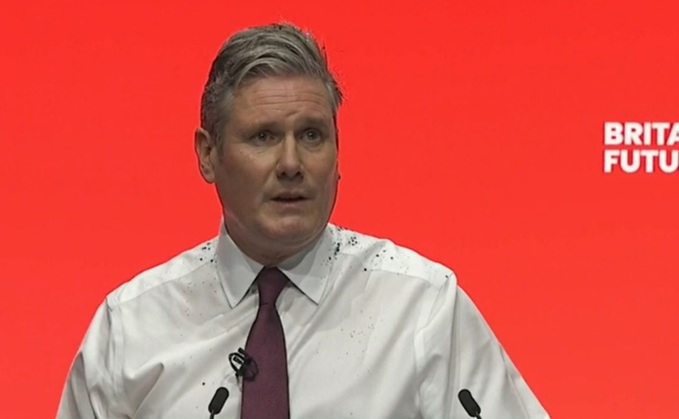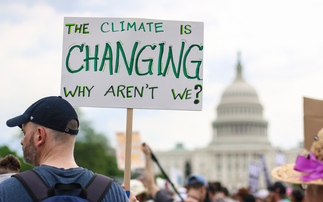
Labour is proposing one of the world's most ambitious green economic programmes, but legitimate questions remain over precisely how it intends to deliver on its stretching goals
We are at that point in the political cycle when the policies and plans of the opposition can suddenly spark more media interest and face greater public scrutiny than those of the actual government. This traditional shift in focus is particularly sharp when the opposition is leading in the polls and a change of government looks increasingly likely. The media stress testing of the opposition's plans that results is also particularly intense when it is a Labour leader accused of prematurely measuring the curtains in Number 10.
This asymmetry is a source of perennial frustration in Labour circles. The well documented right-wing proclivities of the bulk of the print media means it is Keir Starmer's £28bn Green Prosperity Plan that faces daily accusations it is about to explode the UK's finances, while Liz Truss' mortgage-busting game of chicken with the bond markets is consigned to history and Chancellor Jeremy Hunt's plans for utterly implausible post-election spending cuts go largely unexamined. Meanwhile, the Conservative's media arm is now an active participant in the never-ending Tory in-fighting that threatens to further undermine efforts to reinvigorate the UK's flat-lining economy.
But if complaining that the Conservatives get to play politics on easy mode proves cathartic for Labour activists, it is an ultimately pointless exercise. If the opposition wants to make the critical transition in the public's eyes from 'leading in the polls' to 'government in waiting', then its plans need to be robust enough to respond to any and all of the questions posed of them - even when those questions are directed in bad faith. It is on this front, that Labour still has some work to do.
As Labour's newly released campaign 'bible' for prospective candidates makes clear, it is set to go into the election with one the most ambitious green economic programmes ever proposed by a major party in an industrialised nation.
The government is right to argue that it does not get sufficient credit for delivering the steepest emissions cuts of any G20 nation since 2010. It has helped deliver a world-leading offshore wind industry, an historic phasing out of coal power, and a wide-ranging clean tech boom. These are considerable achievements that deserve recognition. But equally, what Labour is proposing would represent both a much-needed step change in the UK's decarbonisation efforts and a concerted attempt to fix the many painfully well-documented flaws and oversights in the current government's net zero strategy. The target to deliver "clean power by 2030" through at least 5GW of floating wind power capacity, a doubling of onshore wind capacity to 35GW, a tripling of solar power capacity to 50GW, a quadrupling offshore wind capacity to 55GW, and a doubling of the current government's green hydrogen target to 10GW is immensely ambitious.
The new guide for candidates also sets out a compelling argument as to why such rapid decarbonisation is needed. This is the means by which a Labour government would curb energy bills, improve energy security, create jobs, and drive wider economic growth. The green energy plans and the economic recovery plans are two sides of the same coin.
And the document starts to explain how such radical changes can be delivered through sweeping planning reform, a proactive industrial strategy, a state-backed green energy investment vehicle and sovereign wealth fund - basically all the things that for reasons of ideology and electoral politics the government has spent 13 years failing to do.
As the guide states: "Gone are the days when we can afford to be complacent and fail to use the power of government to back British business with a proper strategy. It is government's job not just to regulate markets but to shape them and to de-risk them so that we crowd in the private investment that allows new industries to take off. This new approach means we would undertake the biggest ever partnership between government and the private sector to create the clean energy jobs of the future and cut energy bills for good. And in making the transition to these new industries we will not only protect existing jobs, but with new skills and training, create the next generation of highly paid jobs in every region of the country."
However, it is here that the tough questions start. Does the UK really have access to the capital, skills base, and grid capacity to deliver the promised tens of gigawatts of renewables capacity inside a single Parliament? Even if is delivered would this capacity really enable the retirement of fossil gas power plants and the operation of a fully net zero emission grid by 2030? How will the promised national energy efficiency programme work in practice, given so many previous efforts to tackle the UK's cold and damp housing stock have failed? What would Labour do differently to actually get new nuclear projects delivered?
It is these technical policy questions that feed into the increasingly hostile interrogation of Labour's plan to invest £28bn a year in green infrastructure.
The frustrating thing for those who want to see Labour catalyse the investment in the green economy that is so urgently needed is that it is possible to answer most, if not all, of these questions. As Sky's Ed Conway made clear in a must-watch analysis last week, the £28bn a year investment plan is almost certainly affordable and is arguably essential if the UK wishes to match the levels of public investment deployed by its economic peers.
Equally, decarbonising the grid by 2030 is obviously a credulity stretching goal, but it is the kind of target that sends a clear signal to civil servants, investors, and businesses about a prospective government's priorities. Moreover, if it is endorsed by the voting public it would give a new government a sweeping mandate for the kind of planning and energy market reforms required to trigger a rapid acceleration in clean infrastructure project development. It is a moonshot, but people did go to the moon.
The campaign 'bible' may be light on technical detail, but it presents a coherent narrative for how the green transition can drive economic recovery and improve stagnating living standards, alongside a fusillade of attack lines aimed at the government's record.
The problem is a lack of message discipline from parts of the Labour Party is undermining a pitch that polling suggests is actually very popular with the public. Briefing against the £28bn goal from some Labour sources and outriders has amplified concerns that should have already been addressed by Shadow Chancellor Rachel Reeve's insistence any borrowing would remain subject to the Party's fiscal rules. Keir Starmer's comments over the weekend that (inadvertently?) implied Labour may even end up aiming for lower levels of green spending than the current government only added to the sense of confusion.
What is needed is some more detail from Labour on how its planning reforms and industrial strategy would work in practice, as well as greater clarity on how it intends to ramp up green public investment towards £28bn a year - not £28bn over five years - in line with its fiscal rules. In such a volatile economic climate, Labour can reasonably argue that aspects of these plans will depend on how quickly the economic recovery proceeds. But it does need to unequivocally show it has the policies and programmes ready that can drive faster green growth. There is no need to temper or contradict this core message. Indeed, there is more risk for Labour in being seen to flip-flop on its core economic programme than there is in redoubling efforts to sell its vision to the public.
If he can effectively showcase his green economic plans, then Starmer will be in a stronger position to stop taking lectures from Ministers that have overseen a decade of economic stagnation and challenge the government on what it intends to do to drive much-needed investment.
As Chris Venables at think tank Green Alliance observes: "The Labour Party can be rightly proud of the vision it has shown over the last year in putting forward bold and ambitious plans to reboot the economy and secure the UK's energy independence. To backslide now on these vital proposals to lower bills, create warmer homes and protect the planet for future generations would be a catastrophic error. Likewise, the government need to stop playing politics with the greatest threat to our country, and set out their own credible manifesto commitments to tackle the climate crisis."
What is required is a bit more confidence from a Labour Party that says it wants to present a positive pitch to voters and is publicly committed to delivering one of the world's most ambitious climate programmes. Intense scrutiny of Labour's green plans is inevitable and legitimate. If they want to be seen as the change candidates Starmer and co should be leaning into it, not watering down their ambitions to appease political opponents who offer more of the same.
A version of this article first appeared as part of BusinessGreen's Overnight Briefing email, which is available to all BusinessGreen Intelligence members.










